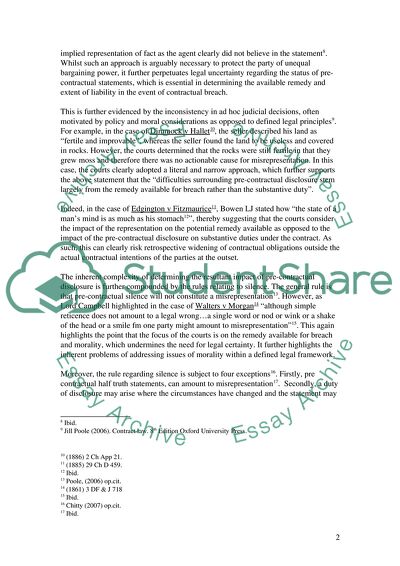
- Home
- Free Samples
- Premium Essays
- Editing Services
- Extra Tools
- Essay Writing Help
- About Us
- Studentshare
- Subjects
- Miscellaneous
- THE DIFFICULTIES SURROUNDING THE PRE-CONTRACTUAL DUTY OF DISCLOSURE STEM LARGELY FROM THE REMEDY AVAILABLE FOR BREACH RATHER THAN THE SUBSTANTIVE DUTY
THE DIFFICULTIES SURROUNDING THE PRE-CONTRACTUAL DUTY OF DISCLOSURE STEM LARGELY FROM THE REMEDY AVAILABLE FOR BREACH RATHER THAN THE SUBSTANTIVE DUTY - Essay Example

- Subject: Miscellaneous
- Type: Essay
- Level: Undergraduate
- Pages: 4 (1000 words)
- Downloads: 0
- Author: lelah68
Extract of sample "THE DIFFICULTIES SURROUNDING THE PRE-CONTRACTUAL DUTY OF DISCLOSURE STEM LARGELY FROM THE REMEDY AVAILABLE FOR BREACH RATHER THAN THE SUBSTANTIVE DUTY"
end, it is clear that often the issue of pre-contractual disclosure becomes most significant when determining liability for breach as opposed to addressing enforcement of performance obligations during the course of contract. This is particularly evident when considering actions for misrepresentation, which has often been at the heart of disputes involving pre-contractual disclosure. The focus of this analysis is to critically evaluate the difficulties surrounding pre-contractual duty of disclosure, with a contextual analysis relating to misrepresentation and insurance contracts where the issue most commonly arises.
A misrepresentation claim is effectively a remedy claim for a party that has entered into a contract in reliance on a false statement of fact made by the other party; which may not have been incorporated into the contract as an express term2. In order to rely on a statement made in the pre-contractual disclosure phase, the statement must constitute a “statement of fact”, which induces the other party to enter into the contract3. However, confusion has reined as to what constitutes a statement of fact, which is distinct from a statement of opinion or belief, statements of future conduct or intention; statements of law; and cases of silence or non-disclosure, which are not generally actionable4.
For example, in the case of Bisset v Wilkinson5, the farm owner stated that he believed the farm would hold a specific number of sheep however the farm had never been used as a sheep farm. It was held that this was merely a statement of opinion not fact. Alternatively, there appears to be a different approach when dealing with statements made by dealers or agents considered to have specific knowledge or skill in relation to the matter6. For example, in the case of Smith v Land and House Property Corporation7, the property was sold with a sitting tenant, yet was described as “desirable” and a “first class investment” to the tenant.
The tenant was
...Download file to see next pages Read More
- TERMS & CONDITIONS
- PRIVACY POLICY
- COOKIES POLICY